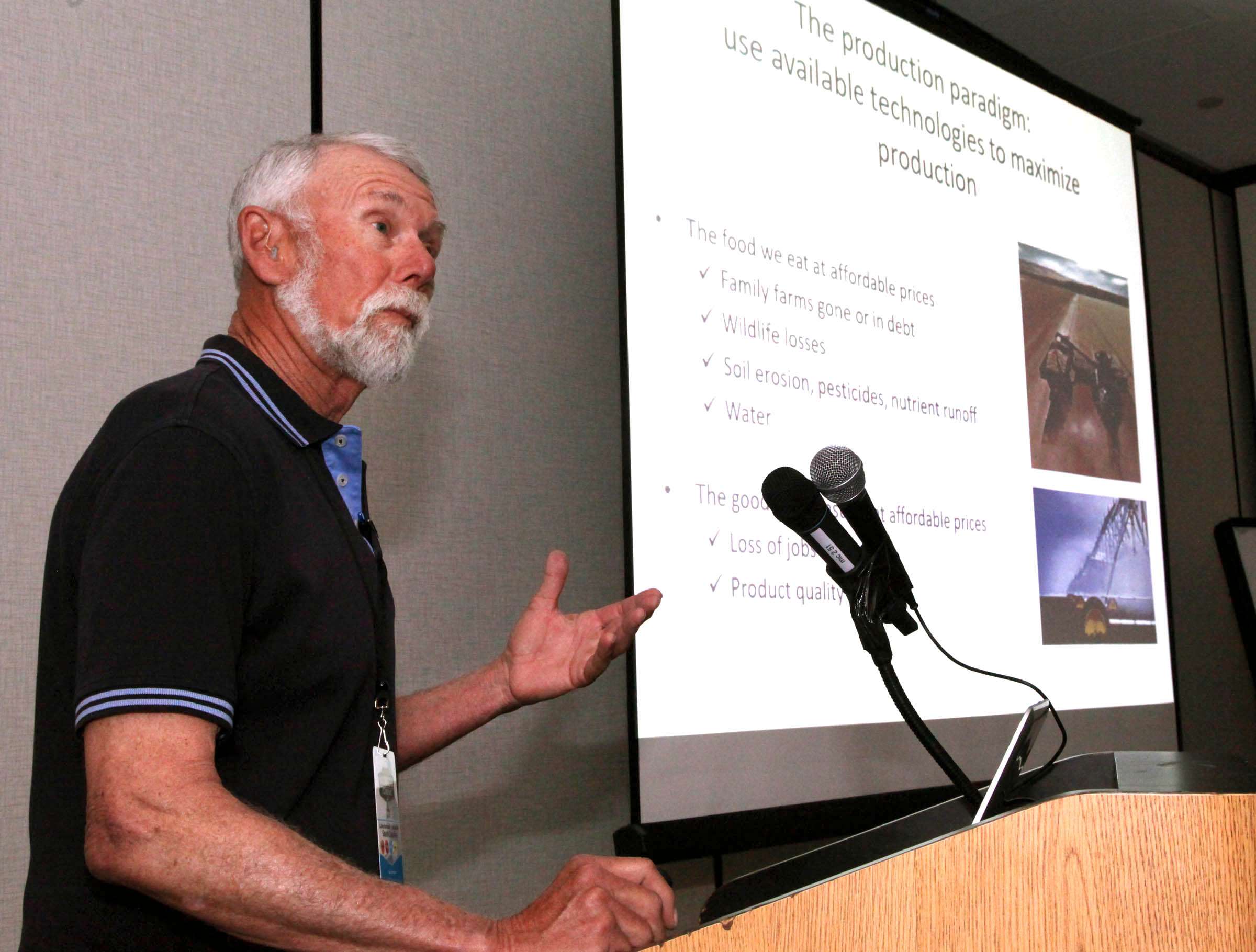
Hal Schramm presents issues of fisheries growth and management to state agency representatives and B.A.S.S. conservation directors from across the country Saturday at the 2018 B.A.S.S. Conservation Summit Saturday morning in Greenville, S.C.
Connecticut BASS Nation Conservation Director Dean Rustic shares views of his workshop group on the future of bass fishing during the 2018 B.A.S.S. Conservation Summit Saturdaymorning in Greenville, S.C.
Science and management practices provided the framework, but the art of communication, community and coalition building emerged as the priority as a nationwide gathering of state agency biologists and volunteer B.A.S.S. Conservation Directors kicked off Saturday in Greenville, S.C. to coincide with the 2018 GEICO Bassmaster Classic presented by Dick’s Sporting Goods.
“A few months ago we looked at several things that got us to thinking about the future of bass management, where are we headed with bass management in this country,” said Gene Gilliland, B.A.S.S. Conservation director said of planning the gathering that takes place every other year at the Classic. “There is no better time or a better group to raise those issues with.”
Research biologist Hal Schramm, recently retired from a long career with several states, most recently with U.S. Geological Survey at Mississippi State University, challenged the gathering of more than 70 biologists, fisheries agency administrators and volunteer B.A.S.S. Nation Conservation directors from 35 states, New York to Washington, and California to Florida, to think about the future of bass management.
He set the stage for discussion by describing the sport fisheries sciences as relatively young science compared to other disciplines.
“We’re still a little behind the curve,” Schramm said.
Looking forward, anglers and resource managers will face growing issues, different ways of considering stocking programs, new ways to think about tackling (or living with) invasive species, degradation of reservoirs with more siltation due to upriver development and, above all, water quality and habitat issues.
Schramm was only the first of the morning to float the idea that anglers of different stripes, as well as fisheries biologists and agencies, must bond together for greater effect.
“For some years I have thought we needed an organization like Ducks Unlimited, except for all fishing,” he said. “We all go our own separate directions, trout anglers, salmon anglers, bass anglers,” he said.
After noting B.A.S.S. has by far created the largest coalition of anglers and industry interests and fisheries biologists, he said, “you are the point of the spear, the cone of the rocket.”
Biologists and anglers in the room separated for a half-hour’s conversation in random groups and reported back on their concerns. Issues by region and by state were indeed diverse, but had common themes in habitat issues, invasive species, and improving communication and coalition building.
One group leader noted, “we’ve got a bunch of organizations in one state who are doing everything, but not together… So how do you get them all together to where you have one voice, one message, one effort and one goal?”
Schramm said the group grasped his message. “I think they got it right. There is no one recipe for this and there are a lot of different issues and different regions and habitats. The point is times are changing and what are they going to do about it,” he said. “You’ve got to look at what you’ve got, then figure out where to go, don’t just do something because it’s supposed to be the thing to do.”
Pat Neu, executive director of the National Professional Anglers Association followed the theme of coalition building in his talk on “slowing the invasion but protecting access” where invasive species are an issue. Some fishing areas have been restricted or closed due to invasive species worries by well-meaning but misguided groups, he said.
His experiences have heightened his belief that fishing needs better representation.
“This industry desperately needs an umbrella organization to bring all factions of the fishing world together,” he said. “We are fractionalized. We have our voices within our community, but I think we need a national anglers alliance and I think we need it 10 years ago.”
Connecting across a diverse and large country and engaging young people ready to get involved fell neatly into the last presentation of the morning, with Bob McAllister and Dave Wilson of McAlister Communication of Columbia, S.C.
In a lively discussion they offered tips on navigating in the “Social Media Age” with McAllister immediately offering his insight on the morning’s discussions.
“The bottom line to what I just heard, and the scary part, is that anglers aren’t organized. That’s a major deal,” he said. “In today’s age there is only one way to do mass organization and that is through social media.”
The Conservation Summit continues Sunday with reports on the latest research in fish care and mortality in catch-and-release, lessons learned in tournament registration systems, and incorporating conservation into B.A.S.S. Nation high school programs.





